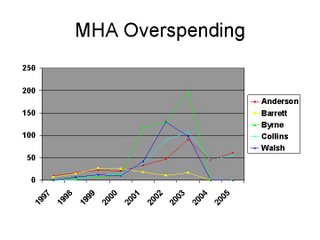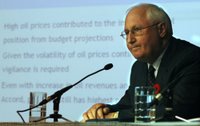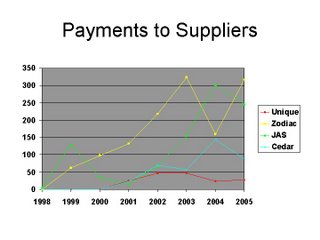Rarely does one see a cabinet self-destruct in as eloquent a manner as Kathy Dunderdale has done.
Over the past two weeks, Dunderdale first defended former Bull Arm boss Joan Cleary, then suddenly sacked her under pressure from the opposition benches during Question Period.
Throughout, Dunderdale maintained the entire matter first of the security shack contract and later of Cleary's firing revolved around supposedly minor errors of process. Dunderdale attempted to trivialize matters, even as she announced that she had asked for and received Cleary's resignation over what Dunderdale described in the legislature as "oversights."
Dunderdale's news
release on December 7, stated that "during the rush to get this work complete before winter set in the proper process under the Public Tender Act was not followed...".
Dunderdale insisted throughout that the
Public Tender Act had been followed. Consider this sentence from the December 7 release:
"The proper process was followed under the Public Tender Act, however, administrative and policy requirements of government were overlooked, which I took very seriously and which prompted me to ask for the broader review..."
At the end of this post is a series of extracts from Hansard containing comments by Dunderdale and by her stand-in during one session, John Ottenheimer. Now Ottenheimer is deservedly a widely respected gentleman with a reputation for honour and integrity. His comments here suggest a fellow merely defending his colleagues in good faith. The next sentence in Hansard after the one cited here contain Ottenheimer's admission that he did not have all the details.
But Dunderdale is a different matter. As minister responsible for Bull Arm, she knew or ought to know intimately what was going on at the site. She apparently did have detailed knowledge of exactly what was going on, at least at several key stages as this sordid business became public.
She chose to keep facts from the public for no good reason. Her defense is the weakest of weak excuses typically offered by those who seek to avoid accountability and transparency: "I was not asked in this House on Thursday to present or table any kind of information on the winterization contract that was let at Bull Arm."
Yet while we take it at face value that Dunderdale has many positive qualities, in this instance we can readily conclude that on more than one occasion she deliberately misled the public about Cleary and the problems at Bull Arm.
For that, Dunderdale owes the people of the province her resignation.
Look specifically at the comments on December 7. Then compare them to her comments in the House of Assembly this week. On December 12, for instance, she stated: "I was quite clear last week, on Thursday here in the House, when I said the winterization contract was done completely outside the
Public Tender Act." She said no such thing. To the contrary, she did all that she could to conceal the truth.
By her own admission, Dunderdale knew all the details when she took the Cleary matter to cabinet on December 7. As a cabinet minister - leaving aside her pompous and self-serving comments about adhering to the
Public Tender Act - Dunderdale had a fundamental obligation to disclose publicly all that she knew as quickly as possible and to take steps to correct the problem.
Her repeated false statements inside and outside the House simply cannot be sanctioned.
She must resign without delay. If Dunderdale does not resign then the Premier must remove her from cabinet immediately if for no other reason than to restore the integrity of his ministry. The public ought not to suffer a minister who willfully and deliberately conceals the truth on such a fundamental matter of ethics and honesty.
Of course, the Premier can keep within cabinet the smart and the stunned as all cabinets are usually comprised. But he cannot keep the false.
We shall all judge him by the company he keeps, if the Premier fails to act. As he well knows, the public is often harsh in its punishments of those who break their trust.
________________________________________
Nov 28Mr. Ottenheimer: Mr. Speaker, in response to that question, I can say with a great degree of confidence that there is no circumvention of any law or any procedure or any proceeding that ought to be undertaken by this government.
Dec 4Ms. Dunderdale: Mr. Speaker, I want to reiterate to his House that Ms Cleary had no involvement in the call for the second amount of bids, the second number of bids.
Yes, Mr. Speaker, while the
Public Tender Act was followed, government's policy of having companies core registered was overlooked in this case. We have taken that very seriously. We are ensuring that all of our boards and agencies are aware of the policy of government, and we will do everything we can to ensure that these regulations are followed in the future.
Dec 6Ms. Dunderdale: Thank you, Mr. Speaker.
I say, Mr. Speaker, I am ultimately responsible for what happens in this department, not Ms Cleary, and I am satisfied in terms of my investigations into this matter that there has been no impropriety.
Dec 7Ms. Dunderdale: Mr. Speaker, I have been providing information in this House since last Wednesday with regard to the security shed contract. I have maintained, and still maintain, that everything was done within the
Public Tender Act, although there were two oversights, which we take very seriously. Because of the uncovering of those two oversights, I instructed my staff to review all recent contracts with the Bull Arm Corporation. As a result of that review, I have found an instance of where work was let at the site and the proper process was not followed, although, I have determined, to my satisfaction, that there was no intentional wrongdoing or political interference. This government is committed to transparency, accountability, openness, and we are fully committed to the
Public Tender Act. As a result of the concerns that have been raised on this piece of work, I have asked for and received Ms Cleary's resignation.
Dec 11Ms. Dunderdale: Honesty is very important, Mr. Speaker, and sometimes when you are honest in small details it will tell you where you are going in the larger picture. I was never asked for information on the winterization contract last week, and when that information becomes available, I have no problem in tabling it here in this House, Mr. Speaker.
...
Dec 12Ms. Dunderdale: Thank you, Mr. Speaker.
The contact was awarded verbally by the President and CEO of the Bull Arm Corporation, and I will have to check back, my documentation, to get the exactly date of that, Mr. Speaker.
...
Ms. Dunderdale: Mr. Speaker, on Thursday of last week, we realized that there had not been anpublicic call for bids, tenders, or Request for Proposals. That was a very serious situation outside the Public Tender Act. As a result, there were very serious actions taken.
Mr. Speaker, files were reviewed in the office of the Natural Resources Building in St. John's. Files were reviewed on-site at Bull Arm around any other documentation that might be relevant in terms of scope of work, all of those kinds of things. That review concluded yesterday, that we did not have documentation around the awarding of the contract. In all of our discussions with the people who have the contract, with the site manager, with the former CEO, there was no indication to us, Mr. Speaker - and that is all I can speak to - that there has been any criminal wrongdoing, that there has been any intentional wrongdoing. I can only accept that information as it is put forward. I do not have anything to substantiate any other kind of claim.
...
Ms. Dunderdale: Mr. Speaker, I was not asked in this House on Thursday to present or table any kind of information on the winterization contract that was let at Bull Arm. That is the long and short of it, Mr. Speaker. Once we have information, then I will be happy to table it in the House.
...
Ms. Dunderdale: Thank you, Mr. Speaker.
I was quite clear last week, on Thursday here in the House, when I said the winterization contract was done completely outside the
Public Tender Act. That is why the actions taken were taken.
As far as I understand - and I have reviewed it completely, Justice is having a look at it, as well as the government purchasing agency - there was no intentional wrongdoing or political interference nor is there any criminal intent, Mr. Speaker.
...
 Rental fees are increasing and order books for new rigs are already backlogged as demand outstrips the ability of the handful of shipyards able to build the behemoths to keep pace. Two new rigs will enter the global fleet in 2007 with another 13 due in 2008. Currently, there are just 18 rigs like Cajun Express [right] capable of drilling more than four miles below the seabed.
Rental fees are increasing and order books for new rigs are already backlogged as demand outstrips the ability of the handful of shipyards able to build the behemoths to keep pace. Two new rigs will enter the global fleet in 2007 with another 13 due in 2008. Currently, there are just 18 rigs like Cajun Express [right] capable of drilling more than four miles below the seabed.













